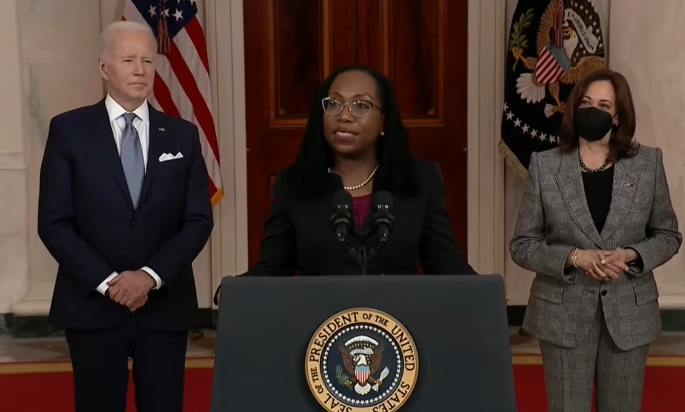In 2019, President Joe Biden’s nominee to the Supreme Court, U.S. Circuit Court of Appeals for the District of Columbia Judge Ketanji Brown Jackson, then a U.S. district judge, blocked a Trump administration policy providing for expedited removal of illegal aliens despite a federal law explicitly providing for it for aliens who had been in the U.S for under two years.
Prior to former President Donald Trump making the administrative change in the execution of the law, expedited removals were narrowly enforced for aliens caught within 100 miles of the U.S. border. But in July 2019, the Department of Homeland Security issued a new policy where the expedited removals would apply wherever an alien was apprehended, not just near the border, as provided for under federal law.
According to then Acting Secretary Kevin K. McAleenan, “The new designation adds one more tool for DHS — utilizing specific authority from Congress — to confront the ongoing security and humanitarian crisis on the Southwest border and throughout the country… We are past the breaking point and must take all appropriate action to enforce the law, along the U.S. borders and within the country’s interior. This designation makes it clear that if you have no legal right to be here, we will remove you.”
Federal law explicitly allows for expedited deportation by Immigration and Customs Enforcement (ICE) of exactly those illegal aliens described in 8 U.S.C. Sec. 1225 (b)(1)(A)(iii)(II): “An alien … who has not affirmatively shown, to the satisfaction of an immigration officer, that the alien has been physically present in the United States continuously for the 2-year period immediately prior to the date of the determination of inadmissibility under this subparagraph.”
And under subsection (I), the Secretary of Homeland Security has singular discretion to implement the policy: “The [Secretary] may apply clauses (i) and (ii) of this subparagraph to any or all aliens described in subclause (II) as designated by the [Secretary]. Such designation shall be in the sole and unreviewable discretion of the [Secretary] and may be modified at any time.”
But despite the explicit grant of authority, Judge Jackson attempted to apply Administrative Procedures Act requirements by saying it was an agency rule, subject to public comment, to what was actually an executive order by former President Donald Trump: “If a policy decision that an agency makes is of sufficient consequence that it qualifies as an agency rule, then arbitrariness in deciding the contours of that rule — e.g., decision making by Ouija board or dart board, rock/paper/scissors, or even the Magic 8 Ball — simply will not do.”
Additionally, Jackson argued that expedited removal would make it harder for asylum seekers to have their cases heard: “There is no evident consideration of the considerable downsides of adopting a policy that, in many respects, could significantly impact people’s everyday lives in many substantial, tangible, and foreseeable ways.”
Jackson was among a cacophony of federal courts throughout the Trump era that acted on a partisan basis against legal immigration actions by the President, arbitrarily striking down or applying injunctions, not because they were illegal but because they were done by former President Trump.
Ultimately and unsurprisingly, in 2020, the U.S. Circuit Court of Appeals for the District of Columbia overturned Judge Jackson, ruling in favor of the Trump administration and noting that the law explicitly meant what it said: “because Congress committed the judgment whether to expand expedited removal to the Secretary’s ‘sole and unreviewable discretion,’ 8 U.S.C. § 1225(b)(1)(A)(iii)(I), the Secretary’s decision is not subject to review under the APA’s standards for agency decision-making. Nor is it subject to the APA’s notice-and-comment rulemaking requirements.”
In Marbury v. Madison, an 1803 Supreme Court decision that upheld the judicial branch’s power of judicial review, in the words of Chief Justice John Marshal, the proper role of the court is to “say what the law is.” That is their job.
This was a case where the law clearly states expedited removal of aliens is solely up to the discretion of the Secretary of Homeland Security. There is no question what the law says. Judge Jackson simply ignored the law, and that is something that the Senate would do well to consider in deciding whether or not to confirm her.
Robert Romano is the Vice President of Public Policy at Americans for Limited Government Foundation.
A version of this article appeared at algresearch.org.







